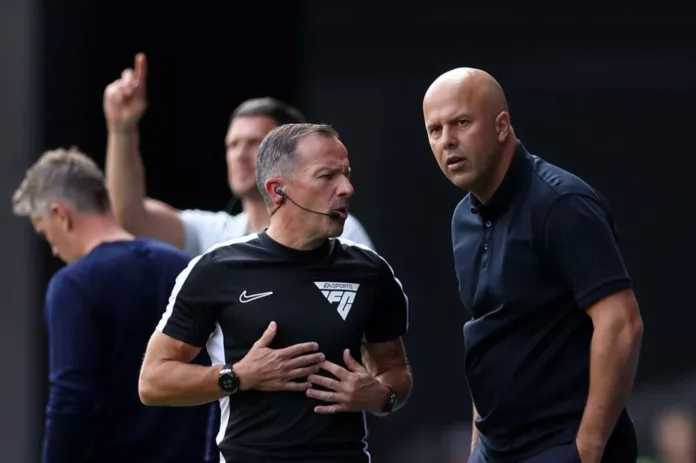Following Liverpool’s match against Ipswich Town in the Premier League, manager Arne Slot talks
Arne Slot has described the strategy shift that enabled Liverpool to start his head coaching career with a winning record. The Reds defeated promoted Ipswich Town 2-0 at Portman Road on Saturday, overcoming a subpar first forty-five minutes with to goals from Diogo Jota and Mohamed Salah in the second half.
During halftime, Slot made the unexpected choice to replace Ibrahima Konate with center-back Jarell Quansah.
And the Dutchman became the first Liverpool manager to win his first league game in charge since Graeme Souness in 1991 thanks to that change as well as an improvement in aggression and energy.
“We didn’t lose the ball excessively, but we did lose an excessive number of duels,” stated Slot. “They (Ipswich) were quite aggressive, but in a positive way aggressive, which resulted in three yellow cards.
We weren’t able to handle that properly enough. That’s what I told them at halftime: instead of accepting that every time we play a ball long, the ball ends, you need to step up in terms of winning your duels first and create a battle out of it if you want to win here.
“Ibou Konate’s arrival was beneficial; he quickly outplayed the (Ipswich) number nine in duels, which allowed us to have plenty of ball control. We had two goals and had the opportunity to score more.
For significant portions of the first half, Liverpool was outclassed by an Ipswich team celebrating their return to the Premier League after a 22-year hiatus.
And Slot thinks that after Jota’s goal on the hour, the Reds were able to run away with the game once they adjusted to the physicality of the hosts.
“As a team, we made a significant shift at halftime, emerging completely different from the first half,” he continued.
That’s why the first half of the match was evenly matched. However, we won more duels, second balls, and balls in behind in the second half.
Make use of players like Luis Diaz, Mo Salah, and Diogo Jota if the opposing squad chose to play one-on-one. We performed better in the second half when we played the balls in behind. We were able to demonstrate our skill and proficiency when possessing the ball as gaps opened up.









